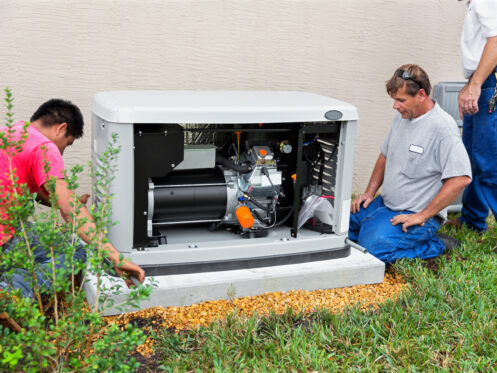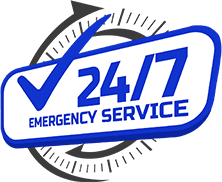Power outages can be frustrating and even scary. Properly preparing your home can bring you peace of mind. While basic emergency preparedness is vital in the event of an outage, preparing a house’s electrical system beforehand can save you money and difficulty in the future. Below are 10 steps you can take now to keep your home safe and functional in the event of an outage.
1. Invest in Battery-Powered Equipment to Take Over in Case of Elec…
While unplugging devices can prevent damage during an outage, the problem is that you’re left without basic necessities like refrigeration, lights, and cooking appliances.
Battery-powered generators, lanterns, and flashlights are a good investment and can help during an electrical outage. You may also want to invest in a battery-powered sump pump to act as a backup pump to prevent flooding in your home. Additionally, a battery-powered camping stove can help with food preparation needs and is much safer to use than a gas or propane stove.
If you have a gas generator, use it outside and as far from windows or doors as possible. Keep battery-powered carbon monoxide monitors in every room to detect any carbon monoxide that may come into the house from using a gas generator. Change the batteries in these devices frequently, too.
2. Make a Plan for Alternate Refrigeration or Power Sources for Med…
One of the most pressing issues during a power outage is the loss of necessary medicine or medical equipment that needs refrigeration or electrical power to operate. A good way to prepare is to have ice and a cooler on hand for temporary refrigeration, and a generator to keep any medical equipment powered. During an outage, avoid opening the refrigerator door, as food can last for a few hours if the fridge is kept as cold as possible.
3. Prepare Alternate Ways to Heat, Cool, and Light Your Home
No electricity means no overhead lights or central heating and cooling. Blankets and sleeping bags made with down are good heat alternatives, while cool baths or staying on the lowest level of the house can help during summer outages. Staying in one room with all the doors closed can also help maintain heating or cooling.
Pipes can freeze and burst during winter outages, so it’s a good idea to drip faucets when the power goes out and wrap the pipes in some kind of insulating material.
Invest in some good flashlights or lanterns and any necessary batteries for lighting. Candles should be avoided, as they can become a fire hazard.
4. Unplug Your Appliances Before the Storm Hits
When power is restored after an outage, an electrical surge can happen, which may overwhelm the outlets in your home and cause damage to devices with a plug. Not only that, but lightning can come through wiring if your house is struck and destroy anything that remains plugged in.
If you know a rolling blackout or storm is coming, move through your home and unplug each appliance or electrical device. Even when the power comes back on, wait for a little while before plugging things back in to ensure that any fluctuations in voltage won’t damage the device.
Don’t forget to think about items like the oven or microwave. Know where these larger appliances are plugged in, and be sure to disconnect them before a potential outage.
5. Charge Batteries or Any Other Necessary Equipment Before a Power…
Your backup generator, lighting, or other necessary electronics will not work unless batteries are charged in advance. Charge up your phone as well, as that may be your only means of communication or local news. It’s a good idea to run your generator a couple times a year just to make sure it’s working. You might look into purchasing alternate means of charging as well, such as portable chargers which can charge your phone in a pinch.
6. Make a Plan for Food Preparation
Stock up on nonperishable foods that don’t require a lot of preparation. Unless you have a battery-powered camping stove on hand, it will be hard to cook anything. Protein bars, fruit leather, trail mix, and beef jerky are just a few items you might consider having on hand.
It’s also a good idea to keep a good supply of water handy as well for both bathing, washing, and drinking.
7. Consider Installing Surge Protectors
Surge protectors act as an extra layer of protection for electrical devices. When the power comes back on, the electrical current can move in sharp spikes or surges. A surge protector can absorb a lot of the shock from these spikes, directing the energy to a grounding wire to prevent the overload from reaching whatever is plugged in.
At Home Team Electric, we’re well-versed in different types of surge protectors and can determine which type is best for your home.
8. Consider a Full Electrical Inspection and Replace Any Necessary …
Electrical systems in a home are made up of a complex system of wiring, fuses, switches, connections, and breakers. Any faulty parts in your system can cause problems with your entire electrical system, especially during emergencies.
Aging, electrical overload, mechanical issues, extreme temperatures, moisture, fluctuations in electricity, and faulty connections can all cause issues with your electrical system. We’ll check for all of these issues and more during an inspection to ensure we correctly diagnose the problem and fix it.
9. Ensure Your Home Is Properly Wired and Up to Code
If you own an older house, getting your electrical wiring inspected can prevent damage to electronics and wiring inside. Building and electrical codes change often, so it’s wise to get your home electrical system inspected frequently. Our certified electricians can consult with you to determine whether your house is up to date and spot any problem areas that need to be fixed.
A properly wired home will be able to withstand true electrical emergencies better than a house with old or faulty wiring. Our electricians can install GFCI or AFCI protections on high-risk outlets such as kitchens and bathrooms for added safety. You might even consider our Home Team Advantage Plan, which provides you with a full safety inspection, annual electrical maintenance, and lifetime warranties on any repairs made, all for a low monthly price.
10. Invest in Homeowners Insurance
Even when we do our best to prepare for power outages, electrical problems, flooding, or damage to the home can still occur. Having insurance can give you a little peace of mind just in case the worst-case scenario happens.
Secure Your Home’s Power with Home Team Electric Today
Based in Palm Springs, California, Home Team Electric provides services to the greater Coachella Valley and Morongo Valley areas. Whether you feel that our services can help with your home emergency preparedness or you’d like assistance with another electrical problem, we’re happy to serve you. Apart from inspections and replacements, our company can replace or install indoor and outdoor lighting as well as install EV charging stations. Contact us today for a consultation!
Related: Home
Related: Electric Panels in Indian Wells, CA
Related: Surge Protection in Beaumont, CA




